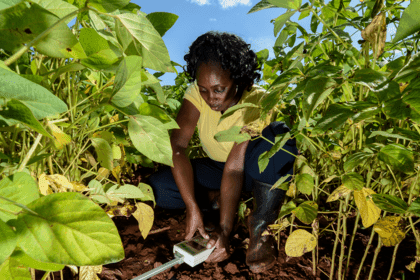
Delivering environmentally sustainable research requires action from science leaders, finds new report
Scientific research will increasingly face questions about its own environmental impact, Wellcome says, with support from leadership necessary to make meaningful change.
A new report published today provides a comprehensive review of the current state of initiatives aimed at reducing the environmental impact of health research. Advancing Environmentally Sustainable Health Research, commissioned by Wellcome, found 146 different such initiatives in place globally, with plenty of enthusiasm for action across the sector. However, it found that these generally rely on the voluntary goodwill of individuals to manage them.
All types of research, from laboratory and clinical to computational, have an impact on the environment whether through energy use or waste produced. Clinical research alone is estimated to be responsible for the equivalent of 100 million tonnes of carbon dioxide emissions each year – comparable to the 40th largest emitting country in the world1.
Through focus groups, interviews and desk research, the report, produced by RAND Europe, found:
- Many guidelines on how to conduct sustainable research already exist and sustainability considerations often align with other priorities, such as research culture and open access.
- There is little in the way of consistent, high-quality and easily accessible guidance for researchers on how to make improvements to research sustainability.
- Currently, activities to make research processes more sustainable are largely driven by the voluntary and unsupported efforts of concerned individuals, on top of existing work. There is also limited funding dedicated to the area of research sustainability.
Talia Caplan, Research Manager at Wellcome, said: “From the plastic waste generated in labs to energy used by large data processing centres, the scientific research we’re relying on to help find solutions to the climate crisis is also contributing to it.
“Research sustainability is an issue that urgently needs addressing and this report is an important step, highlighting the scale of the challenge. There are some established initiatives underway, but these often rely on the goodwill of researchers unsupported in their efforts to keep their work sustainable.
“We hope this report is useful to researchers, but we cannot burden individuals alone with the responsibility if we are to truly make change. This report makes clear that the grassroots efforts must be met by action across the research sector.”
The report highlighted a wide number of research sustainability initiatives, such as the Laboratory Efficiency Assessment Framework (LEAF). It provides detailed and high-quality accreditation to lab-based research depending on performance and is currently implemented in more than 2,000 labs in 85 research institutions across 16 countries. However, the report also highlights gaps between different fields, including no certification scheme such as LEAF identified for clinical, computational or qualitative research programmes.
Other initiatives highlighted in the report included:
- Green Algorithms: An online calculator, with around 15,000 users worldwide, that estimates the amount of carbon dioxide released into the atmosphere by computation, particularly bioinformatics. The tool aims to enable scientists to modify their research to reduce emissions.
- NIHR carbon reduction guidelines: Published in 2019, providing recommendations on how researchers can reduce carbon emissions associated with clinical trials while sustaining the same level of reliability.
Wellcome is publishing the full list of the 146 initiatives identified by the report to help researchers see how their work aligns with currently available support, tools and methods.
The report also identifies the need to ensure that sustainable research practices are supported at an institutional level, with opportunities for training made widely accessible. To build expertise quickly at scale, lab technicians, who have significant relevant knowledge and a broader reach than individual researchers, could be more engaged to support research sustainability, the report suggests.
It also outlines the need for wider, concerted and meaningful engagement at the top level of the research sector. The report argues that universities, journals, funders can all play an important role in advancing environmentally sustainable research, but this must be co-ordinated to deliver consistent guidance, as well as to ensure individuals are supported.
Wellcome is developing a comprehensive environmental sustainability policy for grant holders, with the new policy expected to be published by the end of 2023. Today’s report will help to inform this work.
Alan Dangour, Director of Climate and Health at Wellcome, said: “It’s exciting to see the enthusiasm from researchers who recognise that their work has an impact on the environment and are generating innovative approaches to measure and reduce their footprint. This report suggests, however, that many of these approaches lack the time, resource or backing they need, and as a community we all need to take on more responsibility for setting a clear path for improving the environmental sustainability of health research.
“I hope this report provides both a useful initial summary of the existing tools and initiatives and an urgent prompt for conversation, and more importantly, action to tackle the environmental footprint of health research. Research will be crucial in mitigating the health impacts of climate change, but until sustainability becomes the standard, research will continue to be part of the problem.
“Science is rightly going to face increasingly tough questions about its own environmental footprint, as all areas of society are. We should all be ready to show how we are working to assess and to minimise the environmental impact of our research.”
Notes to Editors
The report, along with the full table of initiatives, is available to read and download here.
-
Estimations of the clinical research carbon dioxide emissions were made by the Sustainable Healthcare Coalition. The country ranking was referenced by Luck & Farley writing for Research Professional.

